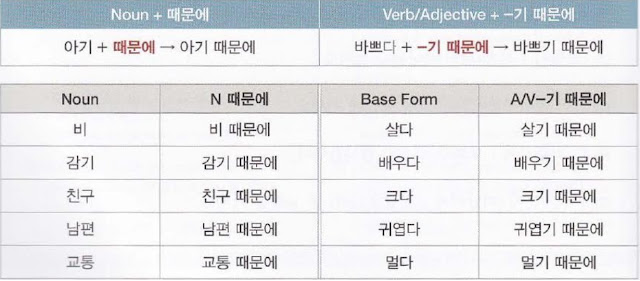 눈 때문에 길이 미끄러워요.
눈 때문에 길이 미끄러워요.
The road is slippery because of the snow.
아이 때문에 피곤해요.
I’m tired because of the children.
외국인이기 때문에 한국말을 잘 못해요.
I can’t speak Korean well because I’m a foreigner.
Grammar Focus: N 때문에, A/V-기 때문에
-때문에 and -기 때문에 express the reason for or cause of the situation described in the second clause and correspond to ‘because’ in English. -기 때문에 is used when expressing a clear reason and is a more literary expression than -아/어서 and -(으)니까. After nouns, 때문에 is added, and after verbs and adjectives, -기 때문에 is added to the stem.
 -기 때문에 cannot be used in imperative or propositive sentences.
-기 때문에 cannot be used in imperative or propositive sentences.
• 날씨가 춤기 때문에 따뜻한 옷을 입으세요. (X)
->날씨가 추우니까 따뜻한 옷을 입으세요. (〇)
The weather is cold, so please wear warm clothes.
• 친구들이 기다리기 때문에 빨리 갑시다. (X)
->친구들이 기다리니까 빨리 갑시다. (〇)
Our friends are waiting, so let’s go quickly.
• 날씨가 좋기 때문에 산에 갈까요? (X)
->날씨가 좋으니까 산에 갈까요? (〇)
The weather is nice, so shall we go to the mountains?
Conversation :
A: 왜 늦었어요? Why were you late?
B: 비 때문에 차가 많이 막혔어요. There was a lot of traffic due to the rain.
A: 토요일에 만날 수 있어요? Can you meet me on Saturday?
B: 토요일은 친구 생일이기 때문에 만날 수 없어요.
Saturday is my friend’s birthday, so I won’t be able to meet you.
A: 방학에 여행 갈 거예요? Will you take a trip during the vacation?
B: 아니요, 가고 싶지만 아르바이트를 하기 때문에 못 가요.
No, I want to, but because I have a part-time job, I can’t go.

